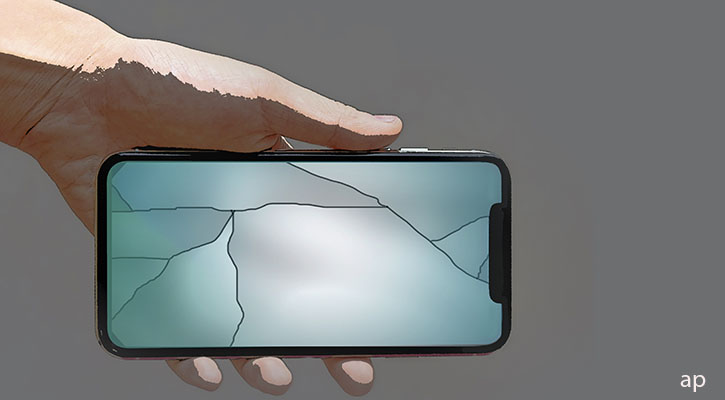
Tech is everywhere these days. But not all of it is "game changing". Morningstar.co.uk's Ollie Smith (OS), Sunniva Kolostyak (SK) and James Gard (JG) share their pet hates.
The Smart Watch - SK
If you’re into healthy living, or like to pretend you are (like me), the smart watch is great for tracking your activity levels. Sadly, it means people can reach me at all times. We are already online and available most of the time anyways, whether that’s through smartphones or laptops, so for me, getting notifications on my phone was already a lot. Because who doesn’t feel pressured to respond to messages immediately? Don’t tell me I can turn the notifications off – I am fully aware – but this does remove half the point of having a smart watch in the first place. And I bet your family wouldn’t be happy if they knew you were blanking them on purpose, either. We shouldn’t have to be online and available all the time. And if you disagree with me, please do not get in touch.
Driving Miss, Daily - JG
One other potentially lethal downside of our smartphone addiction is drivers’ inability to keep fiddling with their phones while on the move. We’ve become so inured to this behaviour and so many people are doing it, that it’s become socially acceptable – the penalties (£200 fine/6 points) are seen as an acceptable trade-off to stay connected at all times.
Many modern cars are hardly distraction free either, with large, shiny consoles acting as satnavs and entertainment systems. These are legal but a driving purist would say: eyes on screens mean eyes off the road.
In fairness, some of new in-car tech may save your life. Your car can tell if you’ve briefly fallen asleep, and can perform an emergency stop for you if you're not quick enough. It can also take better care of pedestrians and cyclists by monitoring your blind spots and taking evasive action. Humans are increasingly the weak link in safely getting from A to B - bring on the driverless era!
Irritation at the Touch of a Button - OS
There are moments when you wonder at the power of technology. And then there are those where your perception of progress is unexpectedly halted. In 2022 almost everything is accessible via smartphone. But when you want a simple question answered about your phone contract, or to transfer numbers between devices, the infrastructure that gives you everything you want all the time takes days to swing into action. What’s more, it requires “PAC codes”, phone calls, and a likely 48-hour delay. You can park dreams of going into a phone shop and getting everything done at the click of a button. What you’ll get is a tiresome queue and a customer representative that’s as exasperated as you are. If anyone from Vodafone Liverpool Street is reading this: you suck.
Digital Bafflement and Exclusion - JG
Why do successive waves of progress have to alienate and exclude? Crypto is the just the latest example: if you don’t understand the jargon, you can’t join the revolution.
And if you don’t have a smartphone or know how to download or use an app, you are effectively shut out of modern society. This has implications from parking your car, banking securely to accessing health services. “You can go online”, is the mantra of every organisation, from your local council to trillion-dollar companies. But smartphones and broadband are not cheap. With people at the financial margins increasingly squeezed, sacrifices have to be made. Digital poverty and exclusion are as real as energy and food bills. Gadgets are also getting more complex. Companies like Currys and Apple have figured out that the “after care” is an important part of their product offering – and there’s a lucrative niche in explaining tech to late adopters.
The Insanity Loop: Two-Factor Authentication - OS
To be clear, I like two-factor authentication (2FA). It makes sense to be vigilant with your online security and personal security. I can also see why companies are such big fans of it. Data breaches ruin brands and destroy consumer confidence in businesses. But all that said, I absolutely abhor 2FA. The sheer number of times you have to complete the process (and switch between devices) makes me think of that quote about doing the same thing over and over again and somehow expecting the same result. It’s important and yet the definition of insanity. If you’re desperate, I can add some nuance to the mix. Some are worse than others. Mimecast’s offering is without doubt the worst thing I’ve ever seen. Competitor Okta’s offering, meanwhile, is really very good and aesthetically pleasing (sort of). But it’s still horrible, and they're all rubbish.
Robotics’ Social Failure - SK
On a serious note, technology has come so far, making our lives infinitely easier, and less dangerous for some. We are able to mass-produce cars and machinery, use biotech for medicine production, and even remote weapons in war. But you’re telling me we don’t have the technology to produce clothes in the same way? We regularly hear about modern slavery and child labour in fast fashion’s sweatshops – and it’s not exclusive to clothes produced in developing countries. Maybe it’s time for robotics to take a look at industries where workers are being exploited to the max and realise that the current human cost is too big.
The Analogue Jet Lag - JG
When lockdown(s) finally ended in the UK, people talked of the joy of doing “real things”, stepping away from laptop and smartphone screens and embracing the non-digital world. Now we’ve rediscovered that real things are boring we’re back on the small screens again. But what if we’re forced to go in the opposite direction? In a time-pressed modern era, real things are an interminable chore. My examples are: getting a solicitor to witness a document, posting something irregularly sized from eBay, or even paying in a cheque. The house purchasing process is replete with wet signatures and in-person meetings. It's justified under "anti money laundering" rules but solicitors, estate agents etc often don't want to embrace the digital age. It often suits them to slow the process down justify delays.
The analogue world was disrupted for a reason, because it is boring, time consuming and wasteful. At least you can check your WhatsApp in the Post Office queue.
Nobody Wins: Self-Service Checkout - OS
Let’s look at the idea of a self-service checkout on paper. You, the customer, go shopping at your local express supermarket, and you put your wares on the stand, scan them, and plonk them in the bagging area. Payment done, you leave feeling happy. Except that it never works like that. Rarely is there enough space to put all your scanned items, and that’s assuming you even manage to scan them first time. And you can’t complete the process alone anyway if you’ve bought anything with danger written on it. I subscribe to the notion that if you want a job done well, you should probably pay for it. Bring back actual people at checkouts. Instead, poor Rachel from the customer service team has to handle a bewildered Ollie as he attempts to “cancel” a pot of hummus that scanned twice. It just feels like nobody wins.
HR Software - SK
If I were to pick one technology that needs to take a long hard look at its user interface, it’s anything HR related. No one wants to spend time on administrative tasks, it’s true. Filling out an expense report might be the dullest high-anxiety task in the modern work life, and even booking your annual leave is a mission. Because, instead of creating a three-click journey, software companies for online work profiles seem to have a collective goal of trapping its users in an endless, over-engineered maze without escape. Want to book a half-day off? How about 5 days, and good luck fixing that error. Expense that lunch? You now owe your company $70 and another £15,000 to the HMRC.
The Cultural Con: 3D Printed Houses - OS
A few years ago there were a lot of videos doing the rounds online that lauded the convenience with which things could be 3D printed. Worst of the lot was the 3D printed house. If I recall correctly, one model was essentially igloo shaped, with two internal spaces: one for sleeping and washing, and another for living and eating. The first problem was this: it was hideous. The second problem was this: it was too flipping small. In response to what is plainly a supply-side crisis of home construction, and over-inflated asset prices, the world has come up with a sub-standard hut that nobody in their right mind would want to live in, let alone sell on to the next buyer. There’s no hope of getting a mortgage on one, so estate agents and mortgage brokers think they suck too. And if they think they suck, well…











.jpg)
















